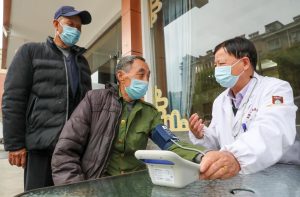Uncategorized
System for safeguarding Chinese people’s living standards further improved

By Yang Hao, People’s Daily
By rolling out a series of policies in the interests of the people and providing them with assistance subsidies, the Chinese government has built a closely knit network for guaranteeing people’s well-being.
In 2014, China’s State Council issued Interim Measures for Social Assistance, which created a full-fledged social assistance system; in 2020, a directive on reforming and perfecting the system was rolled out.
Last year, the annual assistance subsidies allocated to people in need by the central government rose to 147.6 billion yuan ($22.2 billion); and the average subsistence allowance in urban and rural areas across the country grew to 711 yuan and 530 yuan per person per month, respectively, compared with 330 yuan and 172 yuan per person per month in 2012.
China has endeavored to make social assistance more effective. As a tiered and classified social assistance system is gradually built and improved in the country, mechanisms concerning basic living assistance, social assistance for special purposes and temporary assistance in emergencies and disasters have matured.
The country’s subsistence allowance system makes sure that all people with serious illness or severe disabilities and other people eligible for the government’s subsistence allowance can enjoy the allowance.
To ensure that all people in extreme poverty can receive assistance and support from the government, the country’s scheme for assistance and support for severely impoverished people integrates assistance for urban residents without income, the ability to work, or support by family and rural residents eligible for the “Five Guarantees” (food, clothing, medical care, housing, education for orphans or funeral expenses): those who are unable to work and have no source of income, including the elderly, the disabled and minors who have no legal guardians to support them, and regulates the identification of people in extreme difficulty.
The mechanism for temporary assistance makes good use of petty cash of townships and subdistricts for emergency assistance, thus solving the sudden, urgent and temporary difficulties of people in a timely manner.
China has consolidated the fruits of poverty alleviation to guarantee people’s basic living standards.
The Ministry of Civil Affairs (MCA) has introduced measures to strengthen the complementarity of rural subsistence allowance system and poverty alleviation and development policies to solidify the foundations for the social security system for years.
Since the end of 2017, the standards of eligibility for rural subsistence allowances in all Chinese county-level regions have consistently reached or exceeded the national poverty line.
As of the end of 2020, 19.36 million registered impoverished people in China had been covered by the country’s social assistance system, which accounted for 19.6 percent of the population lifted out of poverty in the country.
The MCA has guided regions in improving the system for actively discovering people in straitened circumstances and achieving more accurate identification of the group so that people in need can receive timely assistance.
Lichuan county, Fuzhou city, east China’s Jiangxi province, has ensured precise identification of people in need of social assistance through grid-based management. It has built a three-tiered grid-based database for these people, which includes 561 grids.
Dezhou city, east China’s Shandong province, has established a mechanism for the dynamic monitoring of low-income population and gained a panoramic portrait of the economic situation of each household. Besides, the city has incorporated 42 relief policies and some welfare policies originally handled by 15 functional departments into one platform. By employing data, the city has provided targeted assistance for over 1.18 million people.
Social assistance has effectively made people’s life easier. Ma Jifei, a farmer in Hongsibao district, Wuzhong city, northwest China’s Ningxia Hui autonomous region, tried applying for subsistence allowance for his sick father after he lost sources of income due to the COVID-19 pandemic and had trouble affording medical care for his father. According to Ma, the application was quickly approved.
In an effort to help urban and rural residents who are struck by the pandemic and disasters and thus face troubles with basic living, local civil affairs authorities have adjusted promptly and introduced many social assistance policies and measures, expanding the coverage of subsistence allowance and temporary assistance and providing one-time temporary relief funds for uninsured and unemployed persons that can’t guarantee minimum living standards.
Guided by these policies and measures, governments of areas hit by emergencies and disasters provide temporary assistance in a timely manner for migrants without local household registration status who face severe difficulties with basic living.
These policies and measures also stress enhancing visit to and care services for people amid the pandemic and arranging personnel to provide timely care and assistance for special groups, including the elderly, people with disabilities, and children, in the homes of COVID-19 patients who are being isolated and treated.
As China’s network for safeguarding people’s living standards becomes increasingly tight, the country is bound to achieve even greater results in guaranteeing people’s well-being.
Uncategorized
We’ve Known Each Other Since the 90s; I’m Qualified to Call Him a Scumbag – El-Rufai

Fabian
Former Kaduna State Governor and former Minister of the Federal Capital Territory, Mallam Nasir El-Rufai, has weighed in on the Senate’s decision to reject the inclusion of real-time electronic transmission of election results in the proposed electoral reforms.
Speaking in an interview with Trust TV, El-Rufai was asked to react to reports that some members of his party, the African Democratic Congress (ADC), including Peter Obi, staged a protest at the National Assembly on Monday over the issue. In his response, he stressed that electoral reforms must be approached transparently and without undue external influence.
El-Rufai expressed confidence that the Senate’s electoral committee would eventually recommend the reinstatement of the provision for real-time electronic transmission of results.
He noted that many senators are experienced public officials who have previously served as governors, ministers, and legislators, and are genuinely committed to strengthening Nigeria’s democracy. However, he argued that their efforts are being overshadowed by the actions of the Senate leadership, including Senate President Godswill Akpabio.
According to El-Rufai, the controversy should not be blamed on the Senate as an institution but on its leadership. He alleged that the presiding officer was acting under external pressure and not in line with the collective will of the majority of senators.
He further predicted that when the Senate reconvenes, lawmakers would be forced to unite, resist such pressure from the leadership, and ensure that the proposed reforms are not undermined.
In a strongly worded remark directed at Akpabio, El-Rufai said:
“I do not consider him distinguished. We have known each other since the 90s. He knows how far we’ve been through, and I think I am qualified to call him a scumbag—and he knows why.”
Uncategorized
Electronic Transmission: This Is Just a Warning Protest, We’ll Wait Till Tomorrow – Isaac Fayose

Fabian Apechihin
Businessman and activist Isaac Fayose has described Monday’s protest at the National Assembly complex as only a warning, insisting that more action may follow depending on the outcome of lawmakers’ deliberations.
A cross-section of Nigerians on Monday morning converged on the National Assembly to demand that electronic transmission of election results be made compulsory in Nigeria’s electoral laws.
Although the Senate has issued several clarifications amid reports that it rejected electronic transmission of results, protesters maintained that lawmakers must go further by explicitly inserting the phrase “real-time electronic transmission” into the proposed legislation.
In response to the public outcry, the Senate announced on Sunday that it would hold an emergency plenary session on Tuesday to address the concerns.
Speaking to journalists during the protest, Fayose said the decision taken at the emergency sitting would determine whether the demonstrations would continue.
“We all know what happens in a collation room,” he said. “A collation room is where you soak garri with water at night and by morning it has swollen and turned into eba.
“For Nigerians to be satisfied, what we need is electronic transmission of results. They are already trying to deny it. Let’s wait till tomorrow. This protest is just a warning.”
Fayose also questioned the logic of abandoning electronic transmission after huge investments had been made.
“Something we spent close to a trillion naira to achieve, you now want to throw it away? That’s like taking our money and dumping it in the gutter. It cannot happen,” he added.
Uncategorized
US Judge Issues Final Ultimatum as FBI, DEA Delay Release of Tinubu Records

Fabian Apechihin
A United States federal judge, Beryl A. Howell, has sharply criticised the Federal Bureau of Investigation (FBI) and the Drug Enforcement Administration (DEA) over what she described as deliberate delays in releasing records related to Nigerian President Bola Tinubu.
The documents are being sought through a Freedom of Information Act (FOIA) request filed in 2022 by transparency advocate Aaron Greenspan, with backing from investigative journalist David Hundeyin. The records are expected to provide details on a narcotics-related case from the early 1990s that led to Tinubu forfeiting $460,000 to the U.S. government—allegations he has consistently denied.
In a ruling delivered on February 3, Judge Howell of the U.S. District Court for the District of Columbia rebuked both agencies for repeatedly missing court-ordered deadlines, noting that the case has dragged on for more than three years without substantial progress.
She subsequently imposed new deadlines, warning that further delays would no longer be tolerated.
Greenspan, the founder of transparency platform Plainsite, filed the FOIA request in June 2022. In 2023, the FBI announced it would release approximately 2,500 pages of Tinubu-related records in monthly batches of 500 pages. However, the process stalled after Tinubu opposed the disclosure, requesting a delay pending the outcome of a Nigerian Supreme Court case challenging his election victory. He argued at the time that releasing the records would “adversely affect” him.
Although Judge Howell approved the temporary pause and Tinubu’s election was later upheld, the FBI and DEA continued to seek extensions, further slowing the release of records linked to longstanding allegations of involvement in cocaine trafficking.
Court filings show that the FBI was expected to submit an updated status report in May 2025, but delayed until January 2026, when it sought yet another extension to February—prompting sharp criticism from the court.
“Defendant FBI has produced no records, despite initially anticipating completion of searches by August 1, 2025,” Howell stated, adding that deadlines had been repeatedly shifted with “minimal explanation.”
She further noted that, like the DEA, the FBI had failed to provide a credible timeline for completing the processing and release of the requested documents.
Judge Howell also dismissed the DEA’s justification for withholding documents for more than six months under the guise of inter-agency consultations.
“Defendant DEA has produced some documents … but has repeated the same explanation for six months and four joint status reports concerning twelve remaining pages not yet released,” she said.
The court ordered the DEA to provide Greenspan with a Vaughn index detailing the legal basis for redacting 50 pages and withholding 172 pages of the records. The agency was also directed to submit sworn affidavits explaining, page by page, when the remaining documents were sent for consultation, expected review timelines, and steps taken to expedite the process.
Similarly, the FBI was ordered to file sworn statements accounting for its repeated failure to meet court deadlines and to begin releasing all non-exempt Tinubu-related records. The bureau was instructed to deliver an initial batch within two weeks of January 30, 2026, submit a detailed schedule for releasing the second batch of 500 pages by March 13, and complete full disclosure by June 1, 2026.
Judge Howell further ordered both agencies to file joint status reports every 14 days, starting February 27, until all responsive records have been processed and released.
-

 Uncategorized5 years ago
Uncategorized5 years agoFG, states urged to harness flooding for ranching, others with technology – Agbaje
-

 Headlines10 years ago
Headlines10 years agoBreaking: EFCC seals Borno House of Assembly, as Hon members take to their heels
-

 News12 years ago
News12 years agoNigeria Security Operatives Stage Manhunt For Homosexual Perpetrator
-

 News9 years ago
News9 years agoHow 21-year-old Girl fled community over accusation of lesbianism
-

 News10 years ago
News10 years agoYobe Gov Moves Against Deputy
-

 Opinion7 years ago
Opinion7 years ago7 signs she has friend zoned you
-
Technology4 years ago
Online job placement company headhunts women
-

 Headlines10 years ago
Headlines10 years agoBorno Dep Gov Abducts Another Church Leader





